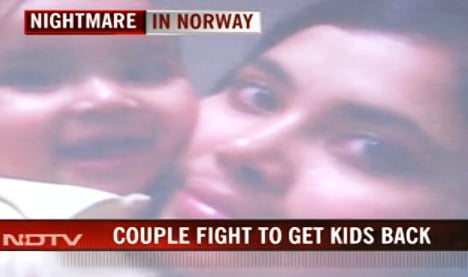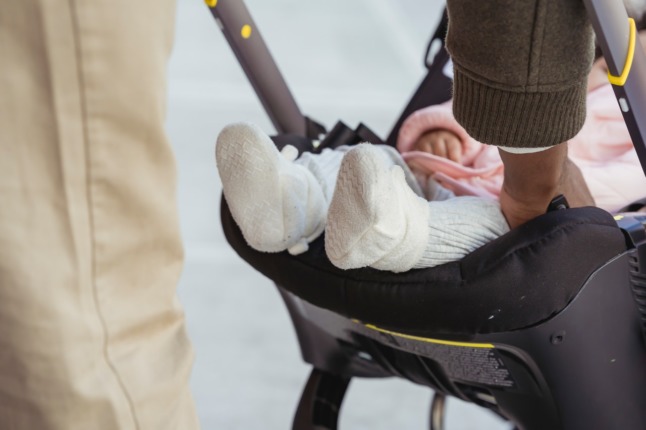The family has asked for an uncle, Kolkata-based Arunabhas Bhattacharya, to be given custody of three-year-old Avigyan and one-year-old Aishwarya.
Anurup and Sagarika Bhattacharya lost custody of their children after officials in Stavanger, south-western Norway, objected to their feeding the children by hand and sharing the same bed, according to press reports.
These are common practices in India, where they are seen as part of the bonding between mother and child.
“The family has put forward a suggestion where the father’s brother will have custody of the children,” Stavanger child welfare services said in a statement.
“An assessment will be made whether a placement with their uncle will be in the children’s best interest.”
The local branch of the agency said it would “make a professional based assessment of the suggested solution before it is presented to the court.”
The Child Welfare Service in Stavanger, where the family lives, has not commented on the grounds for removing the children from their home, insisting the information was confidential.
In Friday’s statement, the agency said it could not come to any agreement with the family without the court’s approval.
“It is up to the appeal court to make a ruling whether the court finds that the suggested solution is in the best interest of the children,” it said.
Although a final resolution has not yet been reached, the parent's lawyer, Svein Kjetil Svendsen, described the message from the Stavanger authorities as "very good news for the parents".
"I gives a clear signal regarding a common solution by which the children will be returned to India," he told Norway's TV 2.
Svendsen said he now expects the children's uncle to travel to Norway to get to know them better and complete some formalities before returning with them to India.
The case took on added urgency this week after India on Monday pressed Norway to act quickly to reunite the two children with their parents.
Indian foreign minister S.M. Krishna told reporters he had called on the Norwegian authorities "to find an amicable and urgent solution to ensure that the children are returned to the biological parents".
Norwegian Foreign Minister Jonas Gahr Støre's office said in a statement that he had spoken with his Indian counterpart on Monday and had assured him that Norwegian authorities were "working hard to find a solution that is in the best interests of the children involved".
Gunnar Toresen, who heads the local branch of the agency, strongly denied on Monday that the "case in any way is based on cultural prejudice or misinterpretation".
He said in a statement that "the Child Welfare Service has a responsibility to intervene if measures in the home are not sufficient to meet a child's needs".
"Examples are when a child is mistreated or subjected to other serious abuses at home, or when there is every probability that the child's health or development may be seriously harmed because the parents are incapable of taking adequate responsibility for their child," he said.
The parents are fighting a legal battle for their children and have already lost their case in a lower court.
According to Toresen, the parents' explanation for why their children had been removed did not figure in the ruling of the County Committee, a family court.
Krishna said he believed that "given the children's young age, removal from the care of natural parents and to be placed in foster care till they turn 18… is an extreme step which should normally be taken as a last resort".
"It's like a nightmare," Sagarika Bhattacharya, the mother, told India's NDTV news channel.
"We only hope that the Indian government will intervene and bring back our children to our laps."
Krishna said he expected to reach a solution which would be acceptable to the children's families and to the Norwegian court.
In a statement released at the weekend, India said the children were being deprived of the "benefits of being brought up in their own ethnic, religious, cultural and linguistic milieu" and must be reunited with their parents.
The case has attracted considerable attention in India, with many questioning the decision of Norwegian authorities.
Brinda Karat, senior member of the Communist Party of India (Marxist) attacked Norway's child welfare services.
"The question is what gives the Norwegian authorities the right, whether morally or even (under) international rules, to take away these babies from their parents?" she told NDTV.



 Please whitelist us to continue reading.
Please whitelist us to continue reading.
Member comments